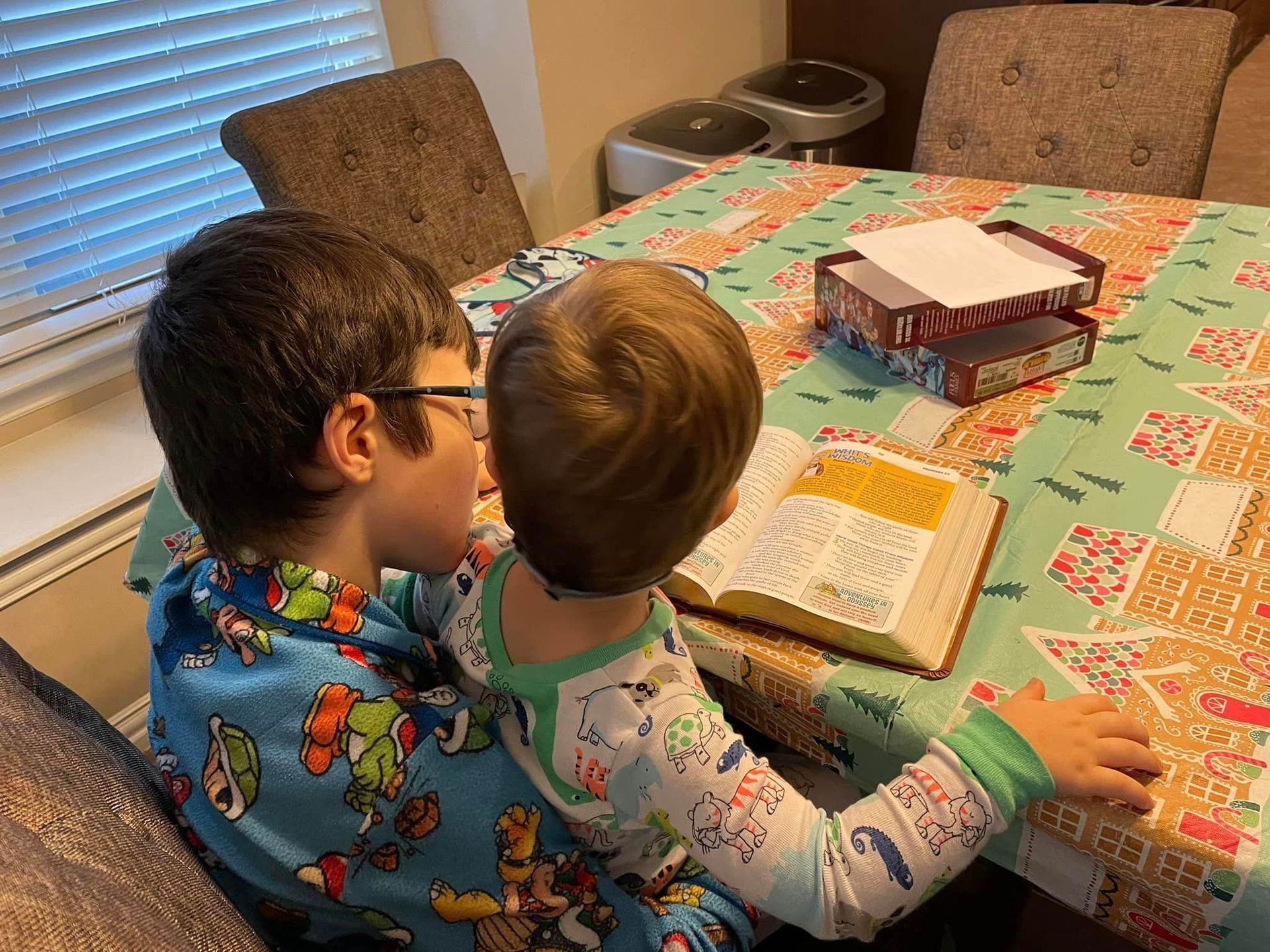Stories from our church
We all have a story to tell. The Lord works in and through each of us. Sharing His works in our lives is just another way we can boldly proclaim the Gospel.
We all have a story to tell. The Lord works in and through each of us. Sharing His works in our lives is just another way we can boldly proclaim the Gospel.
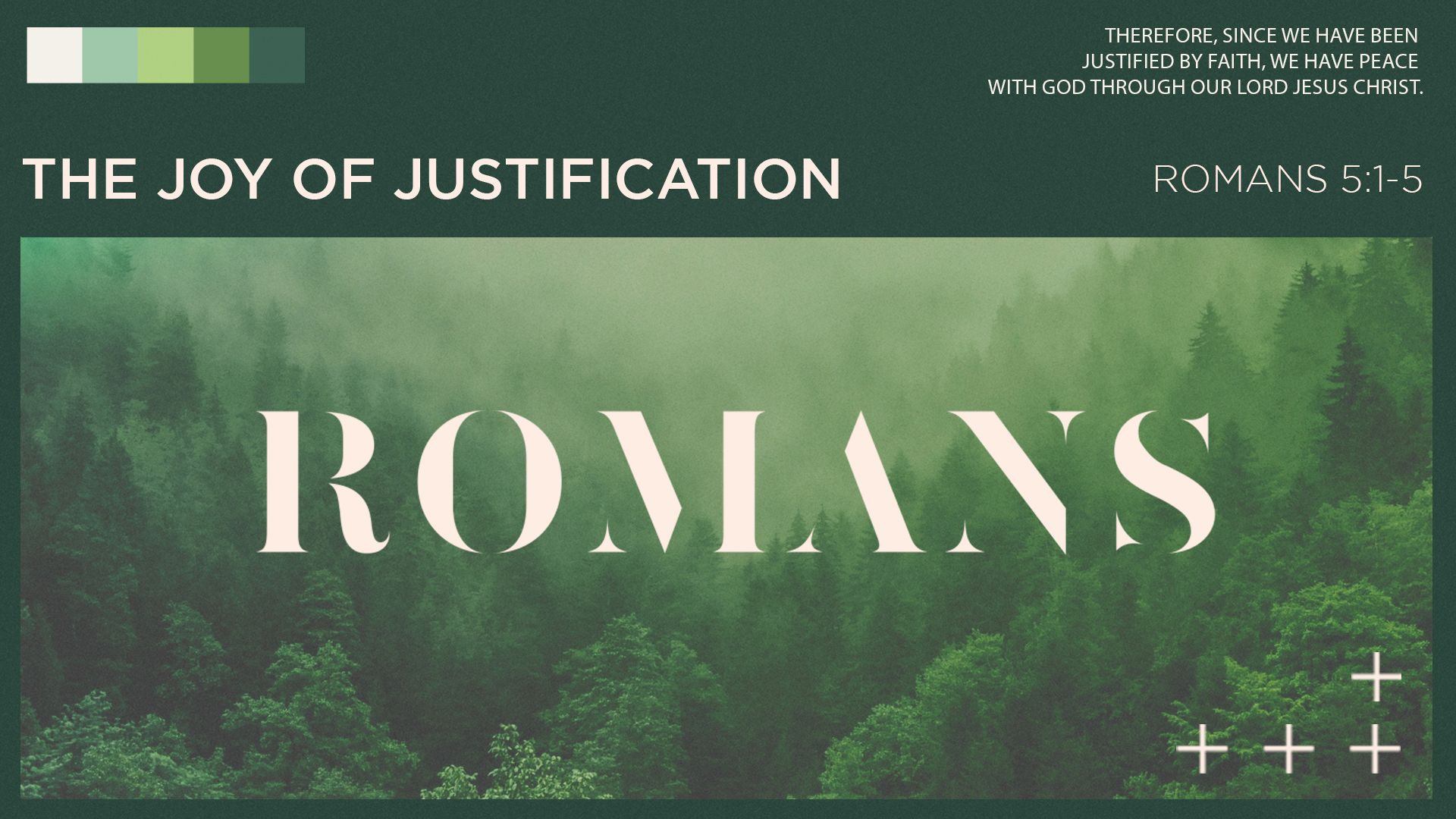
29 Apr, 2024
Notes from Lance Shumake's sermon on Sunday, April 28, 2024. Sermon text: Romans 5:1-5 We find joy in the blessings brought by justification —peace with God —access to God’s grace Hebrews 4:16 Let us then with confidence draw near to the throne of grace, that we may receive mercy and find grace to help in time of need. —hope of the glory of God “Christian hope is not uncertain, like our ordinary everyday hopes about the weather or our health; it is a joyful and confident expectation which rests on the promises of God, as we saw in the case of Abraham. And the object of our hope is the glory of God (2), namely his radiant splendor which will in the end be fully displayed. —John R. W. Stott, The Message of Romans We can even find joy in our sufferings “Various kinds of sufferings will come to us, but we can rejoice in them when we recognize that they serve a purpose: to develop our Christian character. In verses 3b–4 Paul shows how a godly response to suffering can initiate a series of virtues, culminating, strikingly, in hope. Note, however, that Paul is not saying that we should rejoice because of suffering. Evil things are still just that—evil—and we never should be happy about them. But by looking beyond the suffering to its divinely intended end, we still can rejoice in the midst of them.” —Douglas J. Moo, Encountering the Book of Romans —suffering produces endurance “ We know this, especially from the experience of God’s people in every generation. Suffering produces perseverance ( hypomonē , endurance). We could not learn endurance without suffering, because without suffering there would be nothing to endure.” —John R. W. Stott, The Message of Romans —endurance builds character —character gives us confident hope Discipleship Questions: How does it change your outlook on life to know that you have peace with God? In what ways have you experienced the greatness of access to God’s grace? How does future certainty bring us lasting hope? Describe a time when you experienced joy in the midst of suffering. How has God used suffering to grow your faith and mature you? What are some ways you have experienced God’s love being poured into your heart?
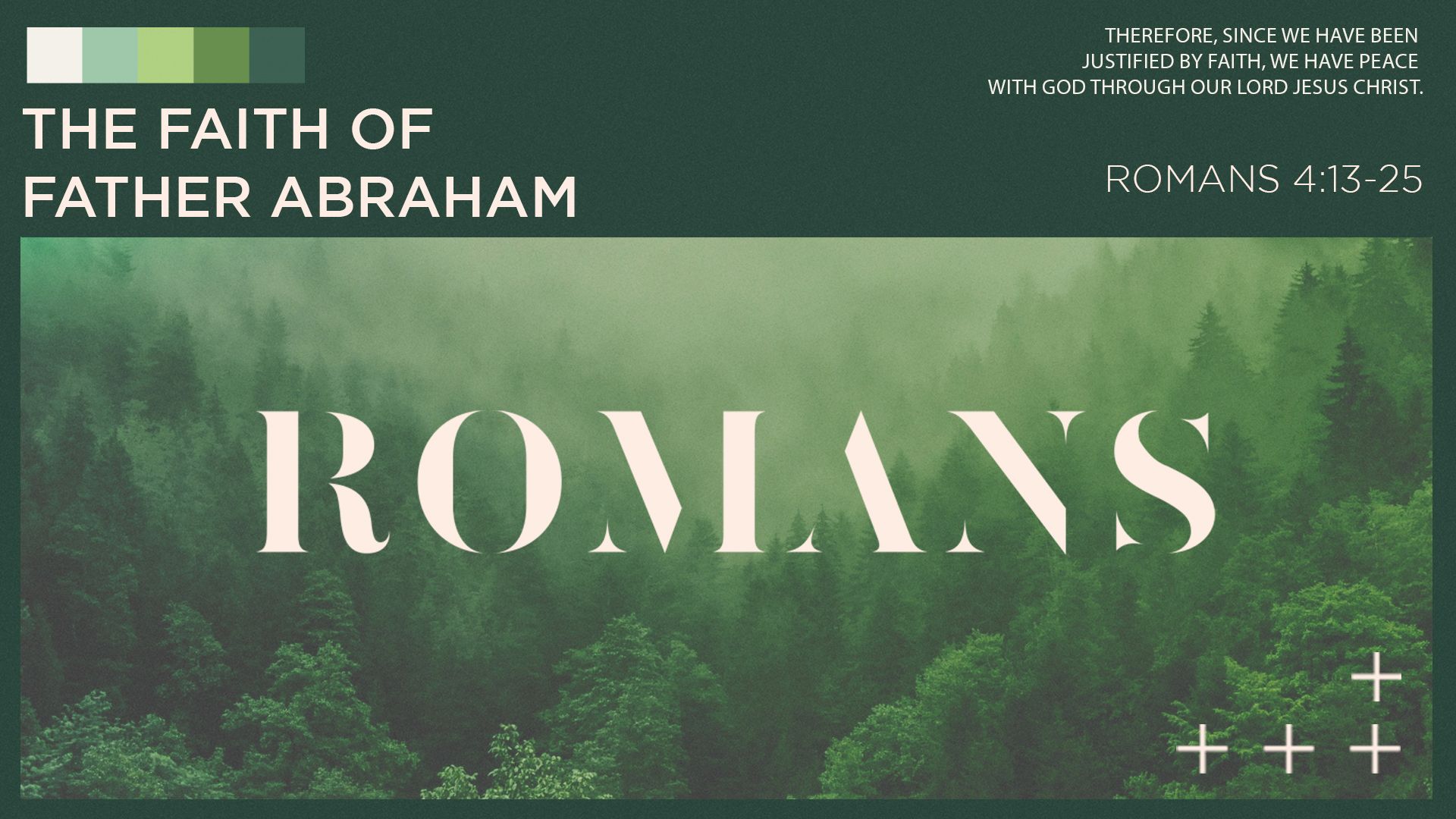
22 Apr, 2024
Notes from Lance Shumake's sermon on Sunday, April 21, 2024. Sermon text: Romans 4:13-25 Abraham was not justified by works Abraham was not justified through the law Justification comes through faith alone —by faith we are forgiven of sin —by faith we are credited righteousness —by faith we are Abraham’s offspring Galatians 3:29 And if you are Christ’s, then you are Abraham’s offspring, heirs according to promise. The faith of Father Abraham… —is trusting God no matter how things appear “Paul next goes on to remind us of the way Abraham believed the promise of God even when all the tangible evidence seemed to point in the other direction. In brief, as Paul succinctly summarizes the matter in verse 18, Abraham believed “against all hope” yet “in hope.” Specifically, he did not allow all the many reasons to distrust God’s promise to weaken his conviction that God would do just what he had promised.” —Douglas J. Moo, Encountering the Book of Romans —is being convinced of God’s power —is taking God at His word —is unwavering, even when we fail “Abraham did not always live out his faith, his obedience was not perfect, his trust fluctuated; but his faith was never extinguished. He hung on to God’s promises even in his own flaws and failings—and as he did so, he “was strengthened in his faith.” He was able to look at a mistake and say: This has reminded me that my only hope is to trust in God’s promise, and trust in God to fulfill that promise.” —Tim Keller, Romans 1-7 For You Discipleship Questions: Spend some time discussing justification and talk about the effects of it on our lives. What are some ways that you trust God in spite of how things appear or how you feel? How have you experienced your faith being strengthened through God’s Word? What are some examples of times you have taken God at His word and acted on it in your life? What do you think it looks like for us to have unwavering faith based on Abraham’s example?
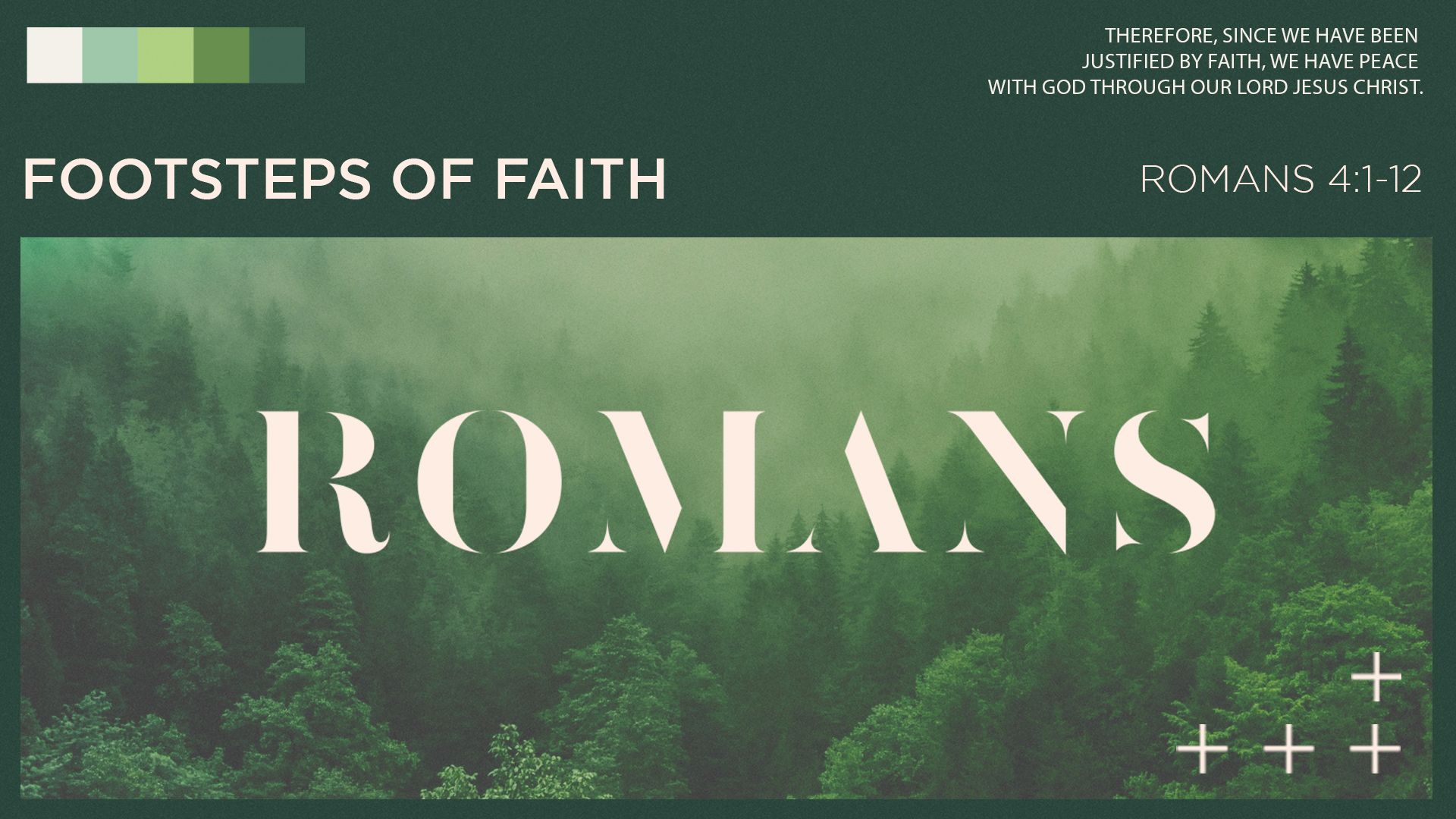
17 Apr, 2024
Notes from Scott Sutton's sermon on Sunday, April 14, 2024. Sermon text: Romans 4:1-12 V. 1-3 “What then shall we say was gained by Abraham, our forefather according to the flesh? 2 For if Abraham was justified by works, he has something to boast about, but not before God. 3 For what does the Scripture say? “Abraham believed God, and it was counted to him as righteousness.” Abraham was not justified by works. Paul chooses Abraham as an example because it is likely that at this point some of the listeners, especially the Rabbis, would have thought, “No one has room to boast? What about our Father Abraham?” There was a cultural perspective in the Jewish community about Abraham that can be read in the books of Jubilees and Maccabbees. “Abraham was perfect in his dealings with the Lord and gained favor by his righteousness throughout his life”… and they quoted Genesis 15, the very verse that Paul is using here, saying, “was not Abraham found faithful in temptation, and it was reckoned unto him for righteousness?” So Paul is arguing that Abraham was not justified by works, because many in the Roman church believed that Abraham was justified by works! This isn’t just an emphasis in a few chapters, it is the heart of the whole letter. Paul is saying, “If he was justified by works, then sure, he can boast before God, but he is not!” And there is a phrase in verse 3 that we must make sure not to gloss over. How does Paul prove this point and bring clarity to their error? FOR WHAT DOES THE SCRIPTURE SAY? We must understand the Biblical narrative because the cultural narrative is always changing. Far more wisdom and effort has gone into the canonization of Scripture than has gone into the picking it apart to prove someone’s point in a certain cultural moment in time. Some today argue that they are listening to Jesus, but not the Bible because they are separating what Jesus says and what the Bible says. It’s an argumentation technique to say, “Well, Jesus didn’t say that. Paul did.” And the result is that people present themselves and posture themselves to look like followers of Christ while dismissing how Christ fulfills all of Scripture. So what does Paul say to the Roman church who was struggling with how this Gospel of Jesus was going against their cultural norms? “What do the Scriptures say?” Justification by faith isn’t some new idea in Jesus. In fact, Father Abraham was justified by faith. V. 4 Now to the one who works, his wages are not counted as a gift but as his due. God did not owe Abraham Imagine getting your paycheck and it is labeled “a gift from management”! You would probably say, “No, I earned that! Thank you very much! That’s not a gift. That is my money.” Now imagine, going to God, and saying of your right standing before Him, “No, I earned that! That is mine. You owe it to me!” Paul’s hope for the Roman church, and for us today, is that we would really consider thoughts like that and really reckon with the reality that we cannot earn our justification. Paul is saying, “I know I have already said it and defended it and given Abraham as an example of the reality that we can only be justified by faith, but I am saying it yet another way so that you would search yourself. If God owed Abraham, then maybe God could owe you, and God owes no man. For the wages if sin is death. That is our due. That is what we are owed. V. 5-8 “And to the one who does not work but believes in him who justifies the ungodly, his faith is counted as righteousness, 6 just as David also speaks of the blessing of the one to whom God counts righteousness apart from works: “Blessed are those whose lawless deeds are forgiven, and whose sins are covered; blessed is the man against whom the Lord will not count his sin.” Faith was counted to Abraham as righteousness. Paul wants the church to see that Jesus is the thread that runs through all of human history. We can see Jesus in the life of Abraham and we can also see Jesus in the life of David. Two of the most prominent figures in Jewish history are who Paul chooses to prove justification by faith alone. When it comes to justification, faith is opposed to work. God justifies the ungodly because there are no godly ones to be justified. When you hear that Faith was counted to Abraham as righteousness, it might be easy to quickly modify that in your mind, and think, “Oh, so Abraham was faithful, and by being faithful, he became righteous… almost like his faithfulness was a substitute for good works…” And that is wrong. There is a HUGE difference between saying “Through faith Abraham became righteous” and “Through faith Abraham was counted as righteous.” It is a judicial reckoning by God. Or for us it is the difference between saying “Now I am righteous” and “Now I am counted as righteous”… Paul wants the church to know that they need something from God that they cannot achieve on their own, and if they are chasing righteousness by trying to live in the right way by saying and doing the right things, they will never find it. You need for God to not count your sin against you. V. 9-12 Is this blessing then only for the circumcised, or also for the uncircumcised? For we say that faith was counted to Abraham as righteousness. 10 How then was it counted to him? Was it before or after he had been circumcised? It was not after, but before he was circumcised. 11 He received the sign of circumcision as a seal of the righteousness that he had by faith while he was still uncircumcised. The purpose was to make him the father of all who believe without being circumcised, so that righteousness would be counted to them as well, 12 and to make him the father of the circumcised who are not merely circumcised but who also walk in the footsteps of the faith that our father Abraham had before he was circumcised. Circumcision is a sign. So for those asking, “Was Abraham’s faith counted to him as righteousness before or after the act of circumcision?”, Paul’s answer is simply, “before”. Why? Because it was a sign. Application: Walk in the Footsteps of Faith … Abraham was not ju stified by works… I am not justified by works. God did not owe Abraham anything… God does not owe me anything. Faith was counted to Abraham as righteousness… Faith can be counted to me as righteousness. Circumcision is a sign… By faith in Christ, I am brought into a rich heritage where my story is the story of a people who were only ever justified by faith alone. So rather than resting in my works, I can rest in Christ. Discipleship Questions: If we know we cannot earn a right standing before God, why do so many of us continue to try? Are there any ways in which you still act and think as if God owes you something? How is circumcision still beneficial to Gentiles in 2024? How does an understanding of the Biblical narrative help us against an ever-changing cultural narrative? Be specific. What are some specific cultural narratives that you and your children struggle with? How does the Biblical narrative help to bring understanding and peace? Why does it matter that your story is the story of a people? Of the 4 footsteps of faith mentioned, which do you struggle with the most? Why? Faith is trusting God's promises. What are some promises that we can lay hold of and rest in?

10 Apr, 2024
Notes from Ky Martin's sermon on Sunday, April 7, 2024. Sermon text: Romans 3:27-31 Not all boasting is bad We are boastful when we think that… We have earned God’s approval God was accepting Abraham, Moses, David and all the Old Testament saints when they repented and trusted in his mercy, but he accepted them on the basis of the future work of Christ. He was already the just Judge who justifies his people. -Tim Keller We are more valuable than others 2 Corinthians 4:6 For God, who said, “Let light shine out of darkness,” has shone in our hearts to give the light of the knowledge of the glory of God in the face of Jesus Christ We can take credit for our accomplishments Jeremiah 9:23-24a Thus says the Lord: “Let not the wise man boast in his wisdom, let not the mighty man boast in his might, let not the rich man boast in his riches, but let him who boasts boast in this, that he understands and knows me… “Why do we imagine God to be so unmoved by our heart-felt attempts at obedience? He is, after all, our heavenly Father. What sort of father looks at his daughter’s homemade birthday card and complains that the color scheme is all wrong? What kind of mother says to her son, after he gladly cleaned the garage but put the paint cans on the wrong shelf, ‘This is worthless in my sight!’?” - Kevin DeYoung 1 Corinthians. 3:5-6 What then is Apollos? What is Paul? Servants through whom you believed, as the Lord assigned to each. I planted, Apollos watered, but God gave the growth. 1 Corinthians. 3:10 According to the grace of God given to me, like a skilled master builder I laid a foundation, and someone else is building upon it. Discipleship Questions: When Paul says in verse 27 that boasting is excluded, what does he mean by that? Do you ever struggle with believing that some people’s testimonies are more miraculous than others? (the guy who grew up in church VS the former drug addict). How does this passage remind us that every salvation is a miracle of grace? Do you even find yourself believing that you’re less deserving of God’s grace than others? Do you struggle with seeing other believers as not being worth your time and investment due to their lack of accomplishments or achievements? What’s the difference in a healthy pride such as Paul mentions in Romans 15:17 and the boastfulness he warns about in Romans 3:27?
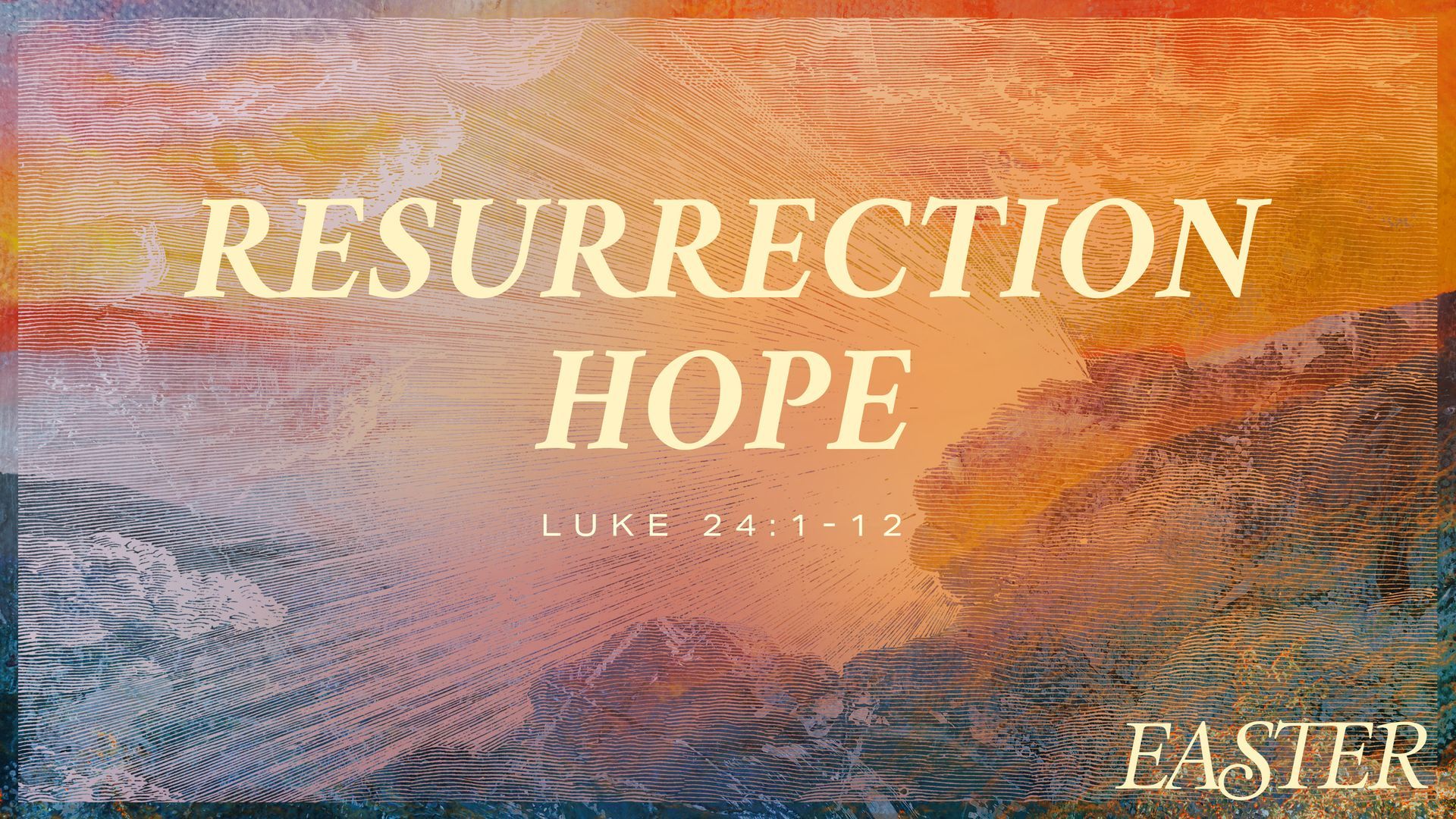
03 Apr, 2024
Notes from Ky Martin's sermon on Sunday, March 24, 2024. Sermon text: Romans Romans 3:21-26 "The chief point, and the very central place of the Epistle, and of the whole Bible.” -Martin Luther Rom. 1:17 “For in it the righteousness of God is revealed from faith for faith, as it is written, “The righteous shall live by faith.” Rom 3:21-22a But now the righteousness of God has been manifested apart from the law, although the Law and the Prophets bear witness to it— 22 the righteousness of God through faith in Jesus Christ for all who believe. Word Pictures in Romans 3: Justification The cross was a drama in the divine courtroom, in which Jesus took our death sentence and we walked free. “Only upon the cross does one die with hands outstretched. Therefore it was fitting for the Lord to endure this, and to stretch out his hands, that with the one he might draw the ancient people [Israel] and with the other those from the Gentiles, and join both together in himself.” -Athanasius Redemption Old Testament Concepts: Debt, captivity, exile, liability to execution New Testament Word: To purchase from captivity or slavery (ransom) “Sometimes it is deliverance from slavery and sometimes from a sentence of death. But both inside and outside the Bible that is the usage… always denotes deliverance from a state of captivity or slavery or from a death sentence… by the payment of a price.” Leon Morris Elements of Redemption: Plight John 8:34 Jesus answered them, “Truly, truly, I say to you, everyone who practices sin is a slave to sin.” Psalm 49:7-8 Truly no man can ransom another, or give to God the price of his life, or the ransom of their life is costly and can never suffice, Price 1 Peter 1:18-19 knowing that you were ransomed from the futile ways inherited from your forefathers, not with perishable things such as silver or gold, but with the precious blood of Christ, like that of a lamb without blemish or spot Galatians 3:13 Christ redeemed us from the curse of the law by becoming a curse for us—for it is written, “Cursed is everyone who is hanged on a tree” Mark 10:45 For even the Son of Man came not to be served but to serve, and to give his life as a ransom for many.” Person: Galatians 4:4-5 But when the fullness of time had come, God sent forth his Son, born of woman, born under the law, to redeem those who were under the law, so that we might receive adoption as sons. Discipleship Questions: What is the setting of the word picture painted by “Justification?”Do you run to this imagery when you experience guilt for sin? Why or why not? What comes to mind when you think of the word “redeemed” or “redemption?” What Old Testament passages or stories come to mind when you think of this word? A redemption or ransom in the New Testament would involve a plight, a payment, and a person. Discuss each of those elements and how they apply to our situation. God loved us enough to pay a ransom price of (the blood of Jesus) order to free us. When we understand our story through that lens, how does it affect our outlook towards God and ourselves?
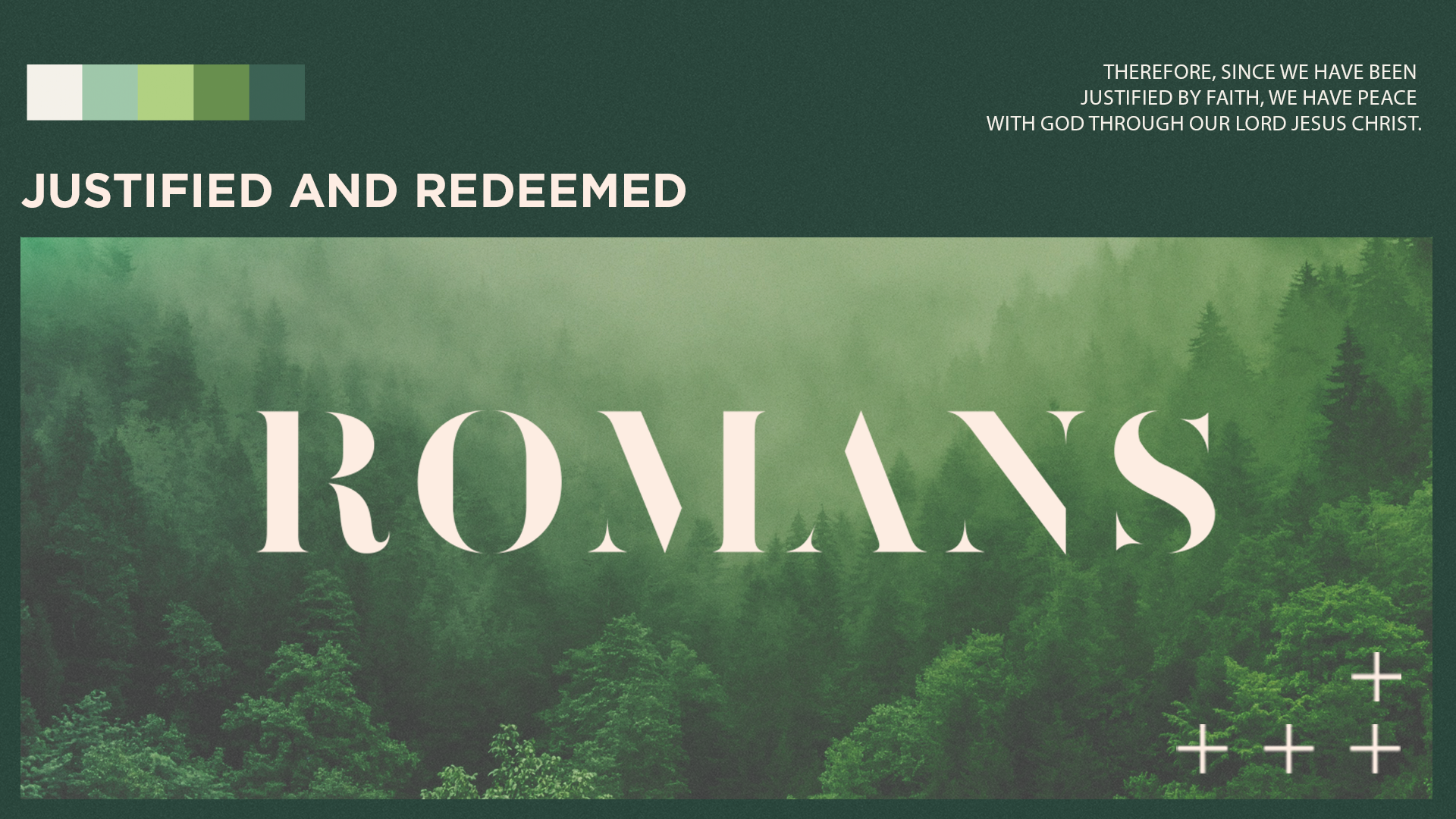
25 Mar, 2024
Notes from Ky Martin's sermon on Sunday, March 24, 2024. Sermon text: Romans Romans 3:21-26 "The chief point, and the very central place of the Epistle, and of the whole Bible.” -Martin Luther Rom. 1:17 “For in it the righteousness of God is revealed from faith for faith, as it is written, “The righteous shall live by faith.” Rom 3:21-22a But now the righteousness of God has been manifested apart from the law, although the Law and the Prophets bear witness to it— 22 the righteousness of God through faith in Jesus Christ for all who believe. Word Pictures in Romans 3: Justification The cross was a drama in the divine courtroom, in which Jesus took our death sentence and we walked free. “Only upon the cross does one die with hands outstretched. Therefore it was fitting for the Lord to endure this, and to stretch out his hands, that with the one he might draw the ancient people [Israel] and with the other those from the Gentiles, and join both together in himself.” -Athanasius Redemption Old Testament Concepts: Debt, captivity, exile, liability to execution New Testament Word: To purchase from captivity or slavery (ransom) “Sometimes it is deliverance from slavery and sometimes from a sentence of death. But both inside and outside the Bible that is the usage… always denotes deliverance from a state of captivity or slavery or from a death sentence… by the payment of a price.” Leon Morris Elements of Redemption: Plight John 8:34 Jesus answered them, “Truly, truly, I say to you, everyone who practices sin is a slave to sin.” Psalm 49:7-8 Truly no man can ransom another, or give to God the price of his life, or the ransom of their life is costly and can never suffice, Price 1 Peter 1:18-19 knowing that you were ransomed from the futile ways inherited from your forefathers, not with perishable things such as silver or gold, but with the precious blood of Christ, like that of a lamb without blemish or spot Galatians 3:13 Christ redeemed us from the curse of the law by becoming a curse for us—for it is written, “Cursed is everyone who is hanged on a tree” Mark 10:45 For even the Son of Man came not to be served but to serve, and to give his life as a ransom for many.” Person: Galatians 4:4-5 But when the fullness of time had come, God sent forth his Son, born of woman, born under the law, to redeem those who were under the law, so that we might receive adoption as sons. Discipleship Questions: What is the setting of the word picture painted by “Justification?”Do you run to this imagery when you experience guilt for sin? Why or why not? What comes to mind when you think of the word “redeemed” or “redemption?” What Old Testament passages or stories come to mind when you think of this word? A redemption or ransom in the New Testament would involve a plight, a payment, and a person. Discuss each of those elements and how they apply to our situation. God loved us enough to pay a ransom price of (the blood of Jesus) order to free us. When we understand our story through that lens, how does it affect our outlook towards God and ourselves?
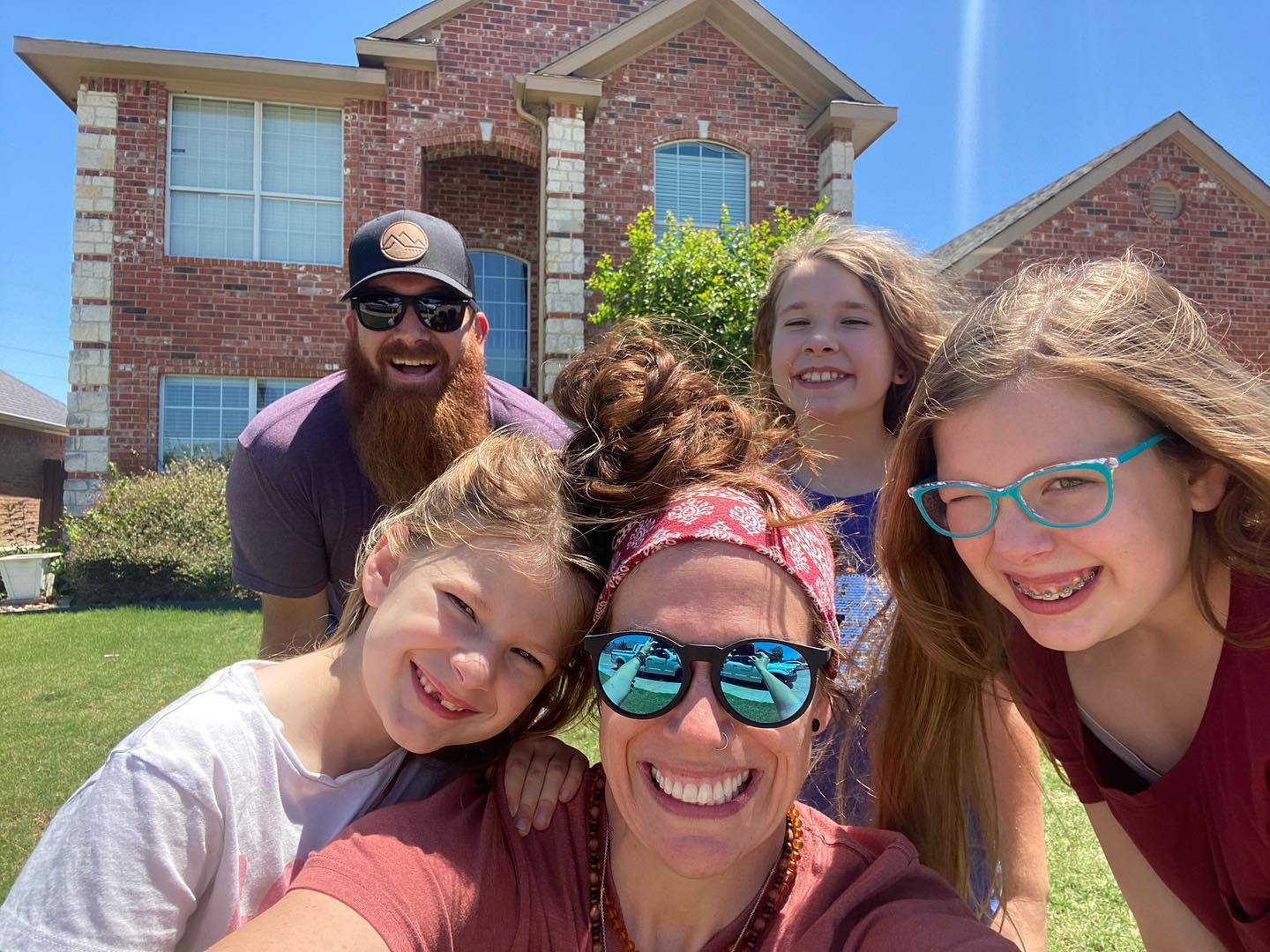
By Kate Stevens
•
01 Jun, 2022
The below post is an excerpt from Crosspoint Staff Member Kate Stevens' blog, Hem-ology. Clint and Kate's recent upending of their lives —and Kate's words on their decision— so well illustrate our message from this past Sunday and what it means "to live is Christ." -- "We are selling our house, moving into an RV, paying off debt, and homeschooling our kids. . . Disclaimer #1 : We believe the same biblical principles apply to everyone, but not the same methodologies. Meanings, we all have the same requirements per Scripture, but different callings of how we carry those out. This is just where God has the Stevens. Disclaimer #2 : It is because of #1 that I feel like I really need to reiterate that we do not think our methodological switcheroo here should be everyone’s. Here is my timeline. You can ask Clint about his. I started praying about our schooling options in September of 2021. Two of my closest friends homeschool their children, yet they constantly pray for my daughters in public school and consistently ask how they are doing. This speaks volumes to me—they aren’t the pretentious homeschool types who believe any other method is a sin. This drew me in to want to closely watch how they did life with their children and to pray about how we do with ours. In February of 2022 one of those same friends talked about moving onto land and even living in their RV while their house was being built if they had to. We’ve gone on a handful of RV trips as a family, and they are amongst my dearest memories, so this was admirable—and interesting. I noticed a different kind of restlessness in Clint. He was a worship pastor for 10 years that ended unfavorably. For the last two years, he’s been trying to figure out what God has for him now that he is no longer bi-vocational. There was a slow simmer of “there has to be more than just an 8:00-5:00 at this job in order to pay for all the things in our lives” that suddenly seemed to turn to a rolling boil. I made a comment that I would sell the house and live in the RV on land with either of our parents or even with friends. We both laughed at that. In the beginning of March, I began reading “Lead: 12 Gospel Principles for Leadership in the Church” by Paul Tripp. In chapter five he is discussing the principle of our character. He challenges us to ask the question “Is what’s important to God still important to us?” And he follows with, “We should always be looking for subtle shifts in values that have progressively changed us and the way we do our work.” This is so simple and basic, but it hit me at a time that was life changing. I wasn’t consistently viewing life through God’s values but my own. Together we started reading “Ruthless Elimination of Hurry” by John Mark Comer in mid-March. We were only reading a chapter at a time because we would have long conversations afterwards. When Comer asks the question, “What is this pace of life doing to our souls?” we both realized Comer had the words to express Clint’s restlessness and my desire for real rest and peace. This question paired with Tripp’s charge to value what God does made me do a hard, honest stop—I hurry through everything to get to the next thing because there are more things lined up after that. I rush discipleship with my students, I rarely read to my kids before bedtime anymore, I do my Bible reading only to check it off and move on to house-cleaning or finish up work on one of my three jobs. I can easily hurry through a meal so I can tear through all the dishes so I can throw my kids in bed so I could collapse in front of the TV or a book. I love everything I am a part of—but I don’t value (or truly enjoy) any of it the way God wants me to. We started praying before bed that God would direct us in what He has for us instead of this frenetic routine with very little gain and no end in sight. How can we value what He does? How can we live in an unhurried way? How can we operate in a way that we are not just paying the next bill in the queue? Somewhere along the way we accumulated so much stuff, and the responsibility and maintenance of all the stuff does absorb much physical and mental space. The crescendo of it all We had just read this chapter of “Ruthless…” called “Something is deeply wrong” and were de-briefing it all. There is a list of ten symptoms of hurry sickness. Workaholism/nonstop activity; hypersensitivity; and the kicker for me: slippage of spiritual disciplines— Comer says, “…quiet time in the morning, Scripture, prayer, Sabbath, worship on Sunday, a meal with your community, and so on. Because in an ironic catch-22, the things that make for rest actually take a bit of emotional energy and self-discipline. When we get overbusy, we get overtired, and when we get overtired, we don’t have the energy or discipline to do what we need most for our souls.” And he ends the chapter with this thought: “Because what you give your attention to is the person you become.” It hit us both at the same time—we were turning into what we didn’t want because of so many big and small choices all compiled into one whopping, tired, hurried blur. We found ourselves quickly talking logistics and finances, seemingly to be only dreaming of what it would look like to profoundly change our family setup. Within an hour we had it all figured out: sell the house, upgrade the RV, move onto my parents’ land, Clint would work from a local office, I could still work from home, pay off nearly all our debt with the earnings from the house, and the girls would. . . ? Oh yea, school. If we moved away from the house then they would switch schools—that would be Harper’s 4th school in 6 years. The girl is resilient, but dang. This is when I confessed that I had been silently praying for months about homeschooling and if it was for us or not. Clint said he knew it—I suppose it was in the company I keep. Ha! Watching those two families, I realized they have a closeness with their children that is admirable and lovely. They are learning so much from one another, both actively and passively. My two big girls learned poetry this year in school, and I realized how jealous I was of their teachers. There are so many other aspects to this like teaching them femininity in organic ways, letting them have the free play they desire and need, not serving the clock or calendar, exploring the subjects that interest them individually, walking in a biblical worldview with them daily and hourly—but the bottom line is that I wanted to keep my kids. And my dear husband heard me and agreed. Carrying on After a three-hour discussion of all the possible pitfalls and landmines, Clint kept saying “If we can pull this off, then _____ could be the benefit” and “If we can pull this off then think of all the ______ that would come from it.” That’s when I labeled this The Heist. It’s as if we have created a self-imposed robbery all these years of our money, emotions, energy, affections—so we are stealing it back. (Yes, cue the trite music here, but it’s a fitting analogy!) We decided to pray again about The Heist and sleep on it. The next night we asked my parents if we could move onto their 36-acre farm in Kaufman, and they instantly said yes. The next three weeks went fast—our house underwent purging, a listing, inspecting, appraising, more and more purging. We are closing on the girls’ last day of school, headed to fulltime RV living. One major detail—we are not fulltime RV traveling. Although we now can drive our home to wherever has a 50amp hookup (and we will take full advantage of that at times), we are called weekly to the local church in the flesh and blood where we know others and we ourselves are known. What God values that I need to value We are only two months into this heart change, and as of writing this we have yet to move into the RV. That happens at the end of this week. But there are a few things God is already drawing me towards. His glory over my comfort Oof, this is a hard one. And as this new season unfolds I suspect another post about how God is undoing my sense of comfort. You see, I have always deeply valued a plan with as many details in place as possible: a fully-stocked refrigerator and pantry, a tidy home, a schedule with a timeline, a list of what to pack, an attendance sheet of who is coming, clearly defined roles and responsibilities—all these things have brought me much comfort in my life because then there are no surprises, and I can be fully prepared to handle whatever is next. And when I say comfort, I really mean transient security because no one can ever be fully prepared for everything. And it has been so foolish of me to operate in that way. But the Lord is stripping this from me, and it started in February of 2021 when I went on staff at Crosspoint Community Church. We have faithful leadership that laughs at that type of faux sense of security. I’m grateful the Lord had me under their leadership then because that’s when the Lord started preparing me for this journey. Ministry work is N-E-V-E-R predictable, especially when you work with students. If I only ever chase everyone around with a clipboard (which is sometimes necessary) all day then what am I saying about our God? That I must handle all the details because He can’t? You may think that’s a leap, but I know my heart and it’s not that big of a step. I have always managed my home much in the same way—constantly tidying up after the girls, stressing over meal plans and preparation, bringing order more than gentleness. My comfort of having a plan so everything can stay on schedule has hijacked the joy behind homemaking. God does not value our attempts at clairvoyance so we can juke the schemes of the devil or natural upsets that interrupt our days. He values order and trust so that He will be glorified, not an over-planning, stressed out admin. A proper work to rest ratio I’ve been known to suffer from mania in seasons—high bouts of productivity with no rest, just work, work, work. And then low periods of straight laziness. It is a form of depression, and whereas it’s been a few years since it has been full-blown, I see glimpses of it from time to time—always when I am not walking in spiritual discipline. This, again, is another form of not trusting the Lord. God showed us how His economy works before man was able to mess it all up: Genesis 2:1–3, “Thus the heavens and the earth were finished, and all the host of them. And on the seventh day God finished his work that he had done, and he rested on the seventh day from all his work that he had done. So God blessed the seventh day and made it holy, because on it God rested from all his work that he had done in creation.” That’s our ratio 6:1. We work 6 days, and we rest 1. Yes, our Sabbath rest looks differently from the Jews of the OT because they didn’t have Jesus as their final rest the way we do now on this side of the cross. Nevertheless, we are still very finite and limited—honestly, it’s absurd when we think of how fragile we are. Surrendering our workload for the sake of rest is trusting the Lord and not ourselves. It’s not about the logistics of which day and for how long—it’s a heart posture of turning out the lights to get good rest instead of frantically staying up to finish a project. It’s rising early to meditate on the Lord and His Word. It’s fasting so we can remember to pray for a specific need or simply be grateful for our lives. It’s turning off the TV to connect with our spouse or to stay up and read an extra book to our kids or stay around the dining room table with friends, recounting the deeds of the Lord. It's living life with joy and gratitude with eternity in view, trusting the Lord with our work and our rest. People are immortal souls God values people’s souls and eternity—I often do not. My comfort and to do list have left me with no margin to have eyes for people’s real needs. In Tripp’s book I mentioned earlier he has his readers meditate on 2 Corinthians 5:16–21. The first part says, “From now on, therefore, we regard no one according to the flesh. Even though we once regarded Christ according to the flesh, we regard him thus no longer. Therefore, if anyone is in Christ, he is a new creation. The old has passed away; behold, the new has come.” Goodness, this has so many implications. But let me just punch one out—people are more than flesh. They are immortal souls. If they are a new creation or if I am to be Christ’s ambassador to them, this fleeting life will surely vanish from them. And then what? Eternity with God or forever separated from Him—it’s sobering and should tether all our thoughts and affections to the Gospel. This distracted life we created around us has caused us to lose sight of it. And yes, that is even working and steadily serving in ministry for years. And there are more of God’s values impressing on us that I see on the horizon: simplicity, self-control, sober-mindedness, humility, gentleness. . . How our kids are doing with this One of our daughters is struggling with leaving behind so much of her stuff. One is struggling with leaving behind neighbors and classmates. One is struggling with leaving behind the house herself (everything gets personified when you have daughters). However, we have had excellent conversations about the temporary vs the eternal. 2 Corinthians 4:17–18, “For this light momentary affliction is preparing for us an eternal weight of glory beyond all comparison, as we look not to the things that are seen but to the things that are unseen. For the things that are seen are transient, but the things that are unseen are eternal.” We are directing them the way the Lord is directing us—we are to be more thoughtful and prayerful of the unseen. It will take much time, patience, and maturity for that to take root. But for now, they are genuinely eager to homeschool. They are ready for more traveling adventures. For the most part, they are ready for us all to be together more. No pretenses If I’ve made this all sound very romantic then just know that we are confident in the Lord and not ourselves. This will be very hard at times. Right now, it feels as if we are running on adrenaline, emotions, and blessings from our closest people. The honeymoon will wane, and we will be in a 43 ft. trailer with our three daughters, two dogs, and what possessions we have left. But we trust in our very good God and His promises. 1 Peter 1:3, “His divine power has granted to us all things that pertain to life and godliness, through the knowledge of him who called us to his own glory and excellence…” 1 Timothy 6:6-7, “But godliness with contentment is great gain, for we brought nothing into the world, and we cannot take anything out of the world” And all of Psalm 64 for when the enemy is shooting lies at us like an archer does with his bow. Remember us in your prayers and tell us how we can pray for you. Invite us over to your home, and we will cook for you while we all recount God’s deeds in our lives. If I ever look frantic and rushed, remind me to chill and slow down. Let me take you to coffee or out for drinks and we can discuss how to abandon our values for the Lord’s. "
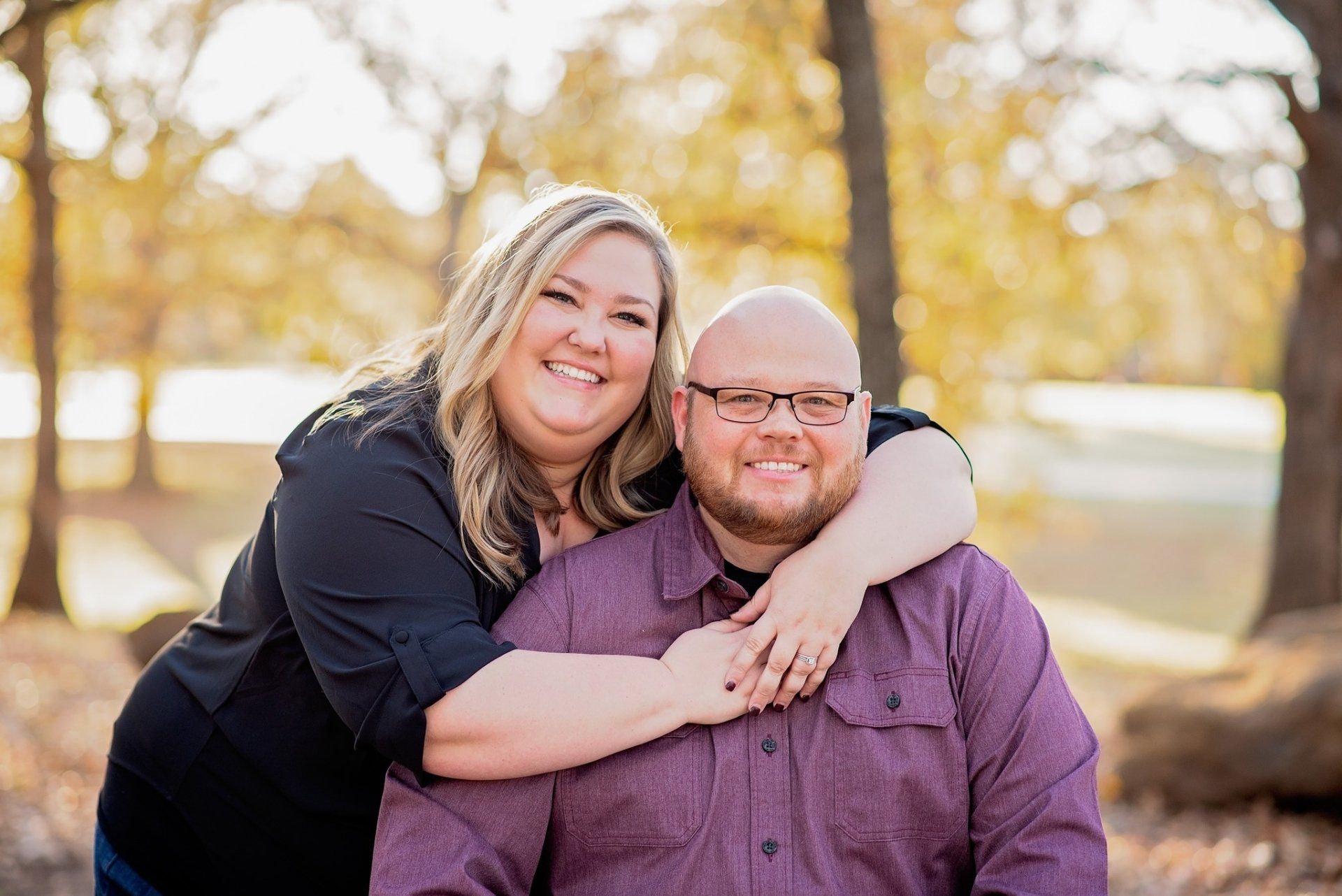
By Morgan Russell
•
19 Jan, 2022
When I met Clint, we were on opposite ends of the spectrum. I was debt free, had no credit cards, and lived using a spending plan. Clint had 12 credit cards and $80,000 in debt. Growing up, the only time I recall seeing my parents argue or fight was around financial issues. When I was in high school, they took a financial class that followed biblical principles and I saw their lives completely change. Their marriage improved significantly, there were no more fights, they were on the same side, working as a team to plan and save and steward well. Watching my parents in high school and college, I learned the principles and took the same class as them. I followed the principles and desired to honor God with what he had given me. After college I was able to pay off my student loans which allowed me to continue to work at the non-profit ministry I loved as well as support friends, tithe, and give to missions. In contrast, Clint grew up in a home where money was not well managed and often faced not having basic needs met due to his parents mismanagement. He did not have anyone to guide or teach him how to manage money God's way. Once we were engaged and started discussing finances in more detail, we struggled to understand the other's way of living. However, a prerequisite for us getting married (per my parents) was to take a biblical finance class. We agreed, and along with premarital counseling, we completed Financial Peace University. Through taking the class, we were able to learn about our past experiences and how we were raised. We learned God's way to steward what he has given us. God unified our hearts and helped us get on the same page financially. Once married, Clint and I spent the next 14 months paying off all debt (not including the house). Mathematically, with our incomes, it made no sense for us to be able to pay off $80,000 in debt, BUT GOD! He made a way! And when we walked in obedience and followed His way of stewarding HIS money, mountains were moved and we were able to yell "we're debt free!!" In April of 2014, after 14 months, God helped us pay off all debt!! We have been living that way every since (...again, minus the house, still working on that). We have been able to save and give in ways we could have never imagined! God has been so faithful to provide and we are thankful for all he has done! In our 8 years of marriage, Clint and I have not had one fight or argument around finances. God has been faithful to keep us united, ultimately knowing that it is not our own, it is His, and that has helped us steward well as well as counsel others throughout the years.
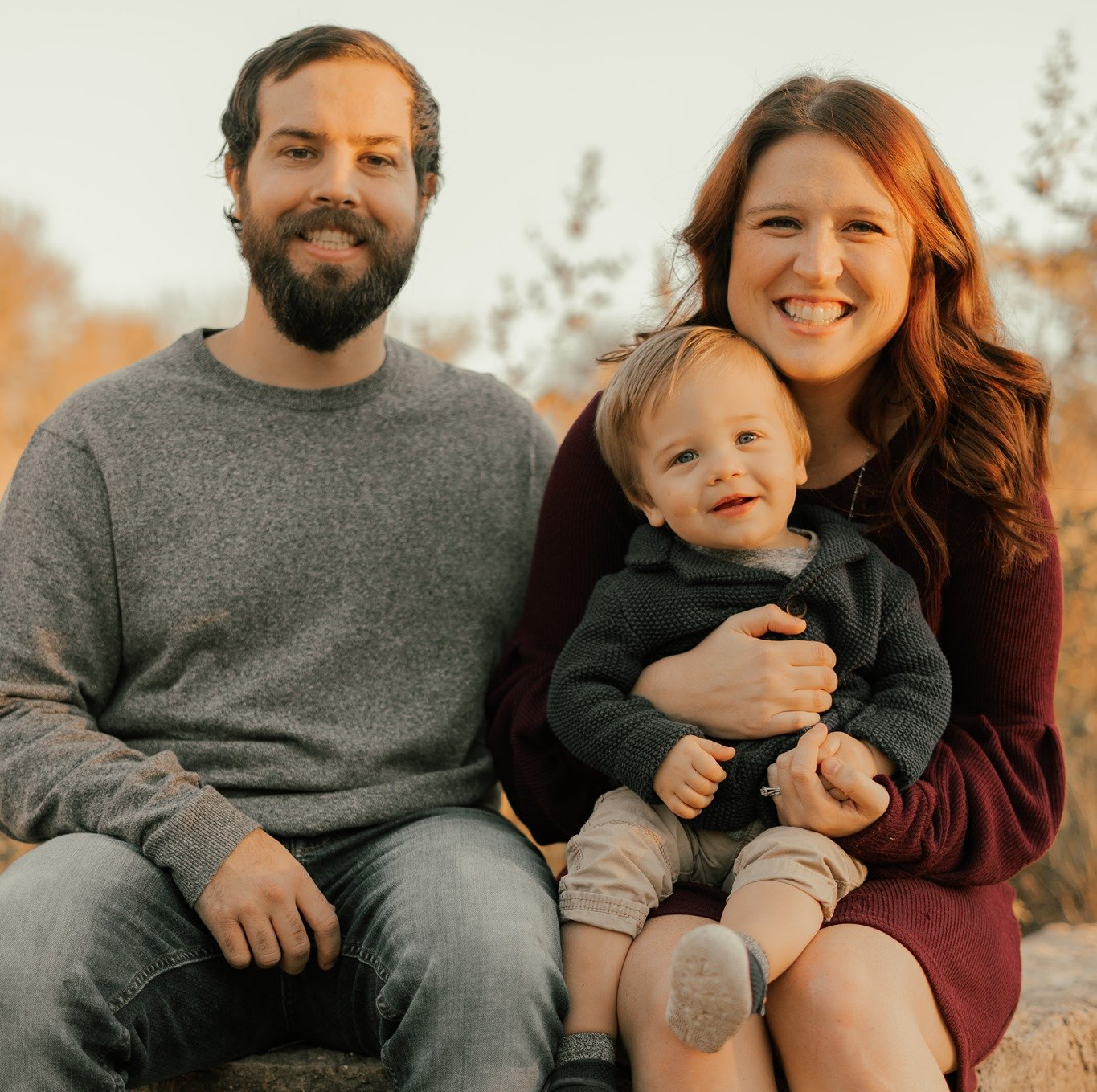
By Website Editor
•
09 Nov, 2021
“When I was 17 years old, a fellow student at HCA came to chapel and shared about his recent mission trip to the Amazon in Brazil. I went home that evening and told my parents that I wanted to go on the same trip the following summer. Since I was young and had never really travelled further than south Texas, my parents thought one of them needed to go with me. My dad drew the short straw, and a few months later we hopped on a plane and flew to Brazil with a group of people we hardly knew. It was during this trip that my dad’s eyes were opened to the world water crisis and the desperate need people have for the Gospel. After this trip in 2012, my dad did some research into the water crisis and water filtration as a way to share the Gospel, and from this, The Bucket Ministry was created. (...Watch Chris’ story, here .)

By Nikolle Bauder
•
06 Oct, 2021
Church planting is in Justin Broady’s blood. He spent his childhood in the church. His grandfather was a pastor and church planter, and his parents were always deeply involved. Justin’s story takes a turn when he was 10 years old and his whole world turned upside-down. After his parents divorced, the always-good-church-kid rebelled and became consumed with things of the world—popularity, hedonism, sports, parties. While attending Texas A&M in Galveston, it grew to a climax as his alcohol addiction led to drugs and other addictions. At 22, he spiraled into a deep depression and felt like he had nothing left. At that very low place of being, God intervened. A friend of Justin’s shared the Gospel with him and invited him to pray. For the first time in his life, Justin realized he needed God’s help and was overwhelmed by the weight of his sin. At that same moment, he was even more overwhelmed by God’s grace and how much he loved Justin. God saved Justin that day and completely changed the trajectory of his life. With help from his grandparents, he quickly got plugged into a church and jumped into leading a recovery ministry. In a relatively short time, Justin went from a place of addiction and despair to preaching the Gospel and praying with others the same way his friend had prayed with him. It was during this season that Justin was reading through the Bible for the first time in his life. He got to the place in 2 Timothy where Paul talks about how Timothy’s faith was given down to him by his grandmother. God spoke to Justin through this and revealed how he had gotten his faith from his grandfather. In that moment, Justin felt a very clear call from the Lord to do what his grandfather did — plant churches. But… he wasn’t ready to hear that quite yet. He rebelled and pushed the message aside. He thought “that’s not for me, I’m not qualified enough.” So, Justin carried on with his life. He got married and started a family. He went into business and launched a successful recruiting company… all the while knowing, in the bottom of his heart, what God had really called him to. In 2018, Justin and his wife Cherish had a strong sense that the Lord was about to do something big. This “something big” turned out to be his business collapsing out of nowhere. He lost clients. He lost employees. He lost a big part of his identity. Wrecked and desperate, Justin called out to the Lord for help. The answer to his plea came in the form of an invitation to speak at a Lakepointe event in Mesquite. At the event, a friend and pastor from Casa View Baptist Church in Garland approached Justin and invited him to join their staff as an associate pastor. After much prayer. Justin took the leap of faith and jumped from the corporate world to the world of full-time ministry. During his two years at Casa View, Justin felt the Lord reminding him what He had originally called Justin to all those years ago. The call intensified, growing stronger and stronger, until one night the Lord woke him up in the middle of the night, asking, “What’s the one thing I asked you to do?” At that point, Justin knew he couldn’t run from it anymore. He felt that, “I need to obey this or I might as well die.” The call was overwhelming and even a little terrifying. Both he and Cherish didn’t know what the next step was, but they trusted in the Lord and made themselves available to His direction. Justin got in touch with his gym buddy, Crosspoint Pastor Ryan Lewis, who he knew had planted a church and was connected with Acts 29. Pastor Ryan invited Justin and his family to come visit Crosspoint and see what the Lord had to say. Justin recalled, “The very first time we came to visit Crosspoint, the scripture reading that day was the exact passage that my wife and I had been praying over our future plans. We had this immediate sense that the Lord was guiding us here and to this church.” Under counsel from our elders and a strong leading from the Lord, the Broadys made the decision to leave Casa View (pastoral position and all) and come to Crosspoint to sit under leadership at our church. Pastor Ryan encouraged Justin to meet with the director of the Church Planting Residency Program at The Village Church in Flower Mound to discuss plans and vision for a future church plant. Though the program is small and selective, Justin was invited into this 18-month program and is currently a full-time resident at The Village. God made a way. With their future church plant, the Broadys are partnering with both The Village and Crosspoint to make it happen. Justin’s residency at The Village consists of being equipped in biblical exposition; church planting; and pastoral leadership and competencies. He gets to see first-hand how staff meetings are led; how vision is cast; how employees are developed; how the congregation is shepherded. As part of the program, his family is visiting a lot of different churches in different contexts. At Crosspoint, the Broadys jumped in as full-fledged members of our body. They are currently leading a community group, serving on Sundays, and learning as much as they can from the leadership at our church. When the time comes, we will send them out. Justin said, “Crosspoint seems to us a healthy, well-led, well-nourished church… and that is something to be celebrated! We want to learn as much as we can while we’re here — to take advice, take correction, take encouragement — so that we’re well-equipped to be sent in 18 to 24 months to wherever God calls us to go.” As far as what their vision looks like for a future church, Justin said that they are seeking a place with a recovery need. Both he and Cherish have a background in recovery ministry as well as hearts to connect in an area with a lot of unchurched or de-churched people. God has placed a desire to create a space where it’s okay to not be okay; a safe place to ask questions and have hard, honest conversations. The Broadys are hoping to identify a church plant location soon. Justin said the Lord placed three areas on their hearts (Florida, Vancouver, and Colorado Springs) — since then, they’ve felt clear guidance away from two of those locations (Florida and Vancouver) and are heading to Colorado Springs this week (October 7 - 9) to see if maybe that’s the place the Lord has for them. While they are there, they will meet with several people and pastors and cover the city in prayer. Rapidly growing, Colorado Springs is one of the most de-churched areas in the country (83-percent of the population does not go to church). While there are two Acts29 churches in the city, there are none in the north, where people have been suggesting that they plant, and both churches are Presbyterian with very different DNA than the church the Broadys would be planting (more similar to Crosspoint/The Village). As partners with the Broady family, we ask our body to commit to lifting them up in prayer throughout the next two years as they prepare to plant. There are a few specific ways you can pray and help right now... Pray over Justin and Cherish’s trip to Colorado Springs. They will be there tomorrow through Saturday (Oct. 7 - 9). Pray for Spirit’s guidance as they meet with leaders there and as they engage with the city. Pray for the Lord’s blessing over Colorado Springs and that His name be known there! Pray for a clear “yes” or “no” for both Justin and Cherish as to whether CO Springs is the place for them. Pray for and consider supporting the Broady family financially. During his residency, Justin is not bringing in any sort of income and will need to fundraise the entirety of the church plant. Pray for the Lord’s continued provision over their family during this season and for Him to provide in abundance toward the church plant! If you feel led to support the Lord’s work through the Broady family, Justin has a donation page set up at reliant.org/justin.broady . There, you can make a one-time donation or set up recurring donations that go directly toward the church plant.
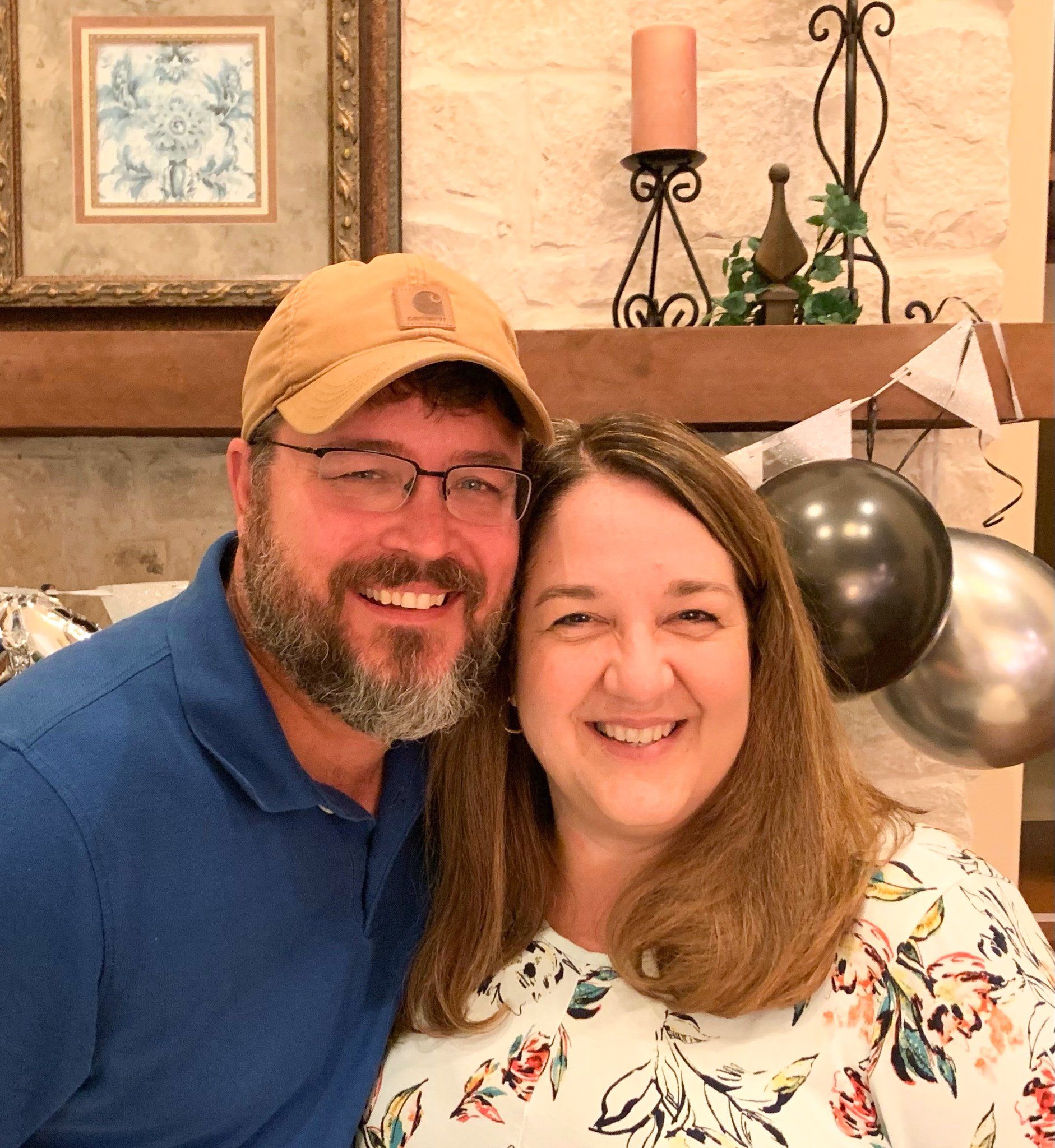
By Website Editor
•
05 Oct, 2021
At our Membership Celebration on September 19, we had the privilege of installing three new deacons to our leadership team at Crosspoint. So far, we have introduced Deacons David Engel and Steve Hay on our blog and social media, and now, we are pleased to introduce Deacon Jonathan Mitchell! -- Jonathan and his wife Amy have been with us at Crosspoint since April 2018. Together, they faithfully lead a community group; Amy serves as a greeter, and Jonathan leads our Safety and Security Ministry. Married for 28 years, the Mitchells have two sons -- Brian (a Dallas firefighter who lives in Royse City with his wife, Rachel); and Bradley (a freshman at Texas A&M and a member of the Corps of Cadets and Fightin’ Texas Aggie Band). Jonathan currently works as a security professional specializing in both Information Security and Physical Security; he is also a retired military veteran with 22 years of DoD service. A pastor’s son, Jonathan moved a lot growing up and continued moving throughout his time in the military. He met his bride while on active duty and their first son was born while stationed at Camp Lejeune, NC. After nine years of active duty service together, the Mitchells left the Navy and settled in Kansas City, MO where Jonathan obtained a degree in Computer Information Systems and an MBA with a concentration in Information Security Management. The Mitchells first began attending Crosspoint after their son Bradley attended Launch Box with our youth group. After returning, he wanted to visit his new friends at their church, so they agreed to “visit”. After their fourth visit in a row, they discovered that Bradley loved attending Crosspoint because they were “going deeper into the Word” and that he had been struggling with the “seeker-focused” approach at their old church. Jonathan said, “Amy and I also realized that over the years we had been subtly lured into becoming more like consumers of the gospel instead of doers. What we had been missing and craving we found at Crosspoint -- a community focused on knowing God through expository study and teaching of His word; an authentic relational community of believers connecting and serving each other with transparency, intentionality, and accountability; and a missional church “making Him known” by training, equipping, and sending.” When asked how the Lord is growing him in this season, Jonathan said, “We are living in chaotic and tumultuous times. It’s so easy to become distracted in a season full of fear, uncertainty, and doubt. Satan would use such circumstances to create division; in our community, in the Church, and in our homes. But these are also the very circumstances that the lost become more receptive to the gospel through the work of the Holy Spirit. Over the last year I have been very focused on standing in the gap for others through intercessory prayer, “putting on the whole armor…” (Eph 6:10-20) and engaging in the spiritual war raging around us, being a more active, intentional, fruit bearing member of the body, and shoring up the gaps in areas I’m prone to fumble, like how I serve and minister to the needs of my bride.” In his free time, Jonathan is an avid outdoorsman and firearms enthusiast. He enjoys minimalist camping, high adventure trekking, hiking, hunting, fishing, shooting, and pretty much anything outdoors. We are thrilled to have Jonathan on our team of deacons at Crosspoint! Comment below with a note of encouragement for the Mitchells.
Join us!
Saturday afternoons at 5:00 and
Sunday mornings at 8:30, 9:45, and 11 at Heritage Christian Academy in Rockwall
1408 S. Goliad St.
Rockwall, TX
Please send mail to:
PO Box 1015 | Rockwall, TX 75087
Subscribe to our weekly updates:
Contact Us
Thank you for your interest in our weekly newsletter!
Oops, there was an error sending your message.
Please try again later
Please try again later


